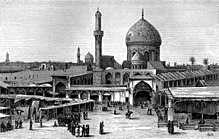

In the history of Baghdad, the period from 1831 to 1917 began with the fall of the Mamluk state of Iraq in 1831 after the Ottoman Empire occupied the city. It ended with the Fall of Baghdad on 11 March 1917 after the British Empire occupied the city during the First World War. Ali Rıza Pasha was a first Ottoman Governor of Baghdad, and Khalil Pasha was the last.
Timeline
- 1832 – The uprising of Abdul Ghani Al-Jameel against Ottoman Governor Ali Reza Pasha failed.
- 1845 – A plague was spreading in Baghdad .
- 1853 – Baháʼu'lláh and his family arrived in Baghdad coming from Iran on 8 April, where he stayed for 10 years.
- 1854 – The Islamic scholar Mahmud al-Alusi dies.
- 1864 – An earthquake happened in Baghdad on 7 December.
- 1869 – Midhat Pasha is now in power .
- 1870
- Municipal council established.
- City walls demolished.
- 1871 – Population: 65,000.
- 1879 – Many Kurds come to Baghdad after a major famine had spread in the Kurdistan region, and this year people from Baghdad knew it would be Bersima year for the city.
- 1895
- Population: 100,000 (estimate) .
- Two Earthquakes happened in Baghdad on 25 November .
- 1897 – The Governor of Baghdad Atteallah Pasha Kawakeby opened the Al-Khar Bridge (Al-Hamidiyah)
- 1908 – Population: 140,000 (estimate).
- 1909 – Cinema built.
- 1911 – Ottoman XIII Corps headquartered in Baghdad.
- 1912 – Population: 200,000 (estimate).
- 1914 – October: Samarra-Baghdad railway begins operating.
- 1915
- Istanbul-Baghdad railway begins operating.
- Al Rasheed Street laid out.
- Cholera epidemic.
- 1917
- March: Fall of Baghdad (1917); British in power.
- Cinema opens.
Ottoman walis (1831–1917)



| Person | Time as governor |
|---|---|
| Ali Reza Pasha | 1831–1842 |
| Najeb Pasha | 1842–1849 |
| Abdul-Karim Pasha | 1849–1850 |
| Mohamed Wajeh Pasha | 1850–1851 |
| Mehmed Namık Pasha | 1851–1852 |
| Rashid Pasha | 1852–1857 |
| Omar Pasha | 1858–1859 |
| Mustafa Nuri Pasha | 1859–1861 |
| Ahmed Tawfiq Pasha | 1861 |
| Mehmed Namık Pasha | 1862–1867 |
| Taqialden Pasha | 1867–1869 |
| Midhat Pasha | 1869–1872 |
| Mehmed Rauf Pasha bin Abdi Pasha | 1872–1873 |
| Radif Pasha | 1873–1875 |
| Abdel Rahman Pasha | 1875–1877 |
| Akif Pasha | 1877–1878 |
| Qadri Pasha | 1878 |
| AbdelRahman Pasha | 1879–1880 |
| Taqialden Pasha | 1880–1887 |
| Mustafa Asim Pasha | 1887–1889 |
| Sırrı Pasha | 1890–1891 |
| Hassan Pasha | 1891–1896 |
| Atteallah Pasha Kawakeby | 1896–1899 |
| Namık Pasha | 1899–1902 |
| Ahmed Fayzi Pasha | 1902–1904 |
| Abdulwahab Pasha | 1904–1905 |
| Abdulmajeed Pasha | 1905–1906 |
| Abu Bakir Hazem Pasha | 1907–1908 |
| Nadim I Pasha | 1908 |
| Najemaldeen Beg | 1908–1909 |
| Mohamed Fadil Pasha | 1909 |
| Shawket Pasha | 1909–1910 |
| Hussain Nadim Pasha | 1910–1911 |
| Youssef Agah Pasha | 1911 |
| Djemal Pasha | 1911–1912 |
| Ali Redha Pasha | 1912 |
| Mohamed Zaki Pasha | 1912–1913 |
| Mohamed Fadil Pasha | 1913–1914 |
| Süleyman Nazif Pasha | 1914–1915 |
| Nurialdeen Pasha | 1915 |
| Khalil Pasha | 1916–1917 |
See also
Notes
- Bersima is the Kurdish word for famine.
References
- Longrigg, Stephen Hemsley (1925). Four Centuries of Modern Iraq. Oxford University Press. pp. 270–273.
- "الوالي العثماني الأخير.. خليل باشا". Almada. May 22, 2016.
- "إندلاع ثورة عبدالغني أل جميل ضد الوالي العثماني علي رضا باشا". Saida Gate. December 23, 2020.
- ^ "Abbas Al-Azawi - History of Iraq between Two occupations - part 7". Masaha. December 5, 2020.
- "The history of the Bahá'í faith proper begins with the 19th-century nobleman Bahá'u'lláh". BBC TV. September 28, 2009.
- "الإمام الألوسي". Islam Story. May 1, 2006.
- ^ Michael R.T. Dumper; Bruce E. Stanley, eds. (2008), "Baghdad", Cities of the Middle East and North Africa, Santa Barbara, USA: ABC-CLIO
- Edward Balfour, ed. (1871). "Baghdad". Cyclopaedia of India and of Eastern and Southern Asia (2nd ed.). Madras.
{{cite book}}: CS1 maint: location missing publisher (link) - (Firm), John Murray (1895). "Michael R.T. Dumper; Bruce E. Stanley, eds. (2008), "Baghdad", Cities of the Middle East and North Africa, Santa Barbara, USA: ABC-CLIO". J. Murray. ISBN 9780524062142. Retrieved 1 July 2020.
- ^ "Abbas Al-Azawi - History of Iraq between Two occupations - part 8". Masaha. December 5, 2020.
- Lorimer (1908). "City of Baghdad". Gazetteer of the Persian Gulf. Calcutta.
{{cite book}}: CS1 maint: location missing publisher (link) - Oliver Leaman, ed. (2001), Companion Encyclopedia of Middle Eastern and North African Film, Routledge, ISBN 9780415187039
- "Baghdad", Palestine and Syria (5th ed.), Leipzig: Karl Baedeker, 1912
- "Iraq Profile: Timeline". BBC News. Retrieved 11 April 2013.
- Stephen Pope; Elizabeth-Anne Wheal (1995). "Select Chronology". Dictionary of the First World War. Macmillan. ISBN 978-0-85052-979-1.
- "ولاة بغداد من قبل العثمانيين (مرة رابعة)". Hukam. December 11, 2020.
- Owem, Roger (31 December 1993). The Middle East in the world economy, 1800–1914. Bloomsbury Academic. ISBN 9781850436584.
- Ágoston, Gábor; Masters, Bruce A. (2009). Encyclopedia of the Ottoman Empire. Infobase. ISBN 9781438110257.